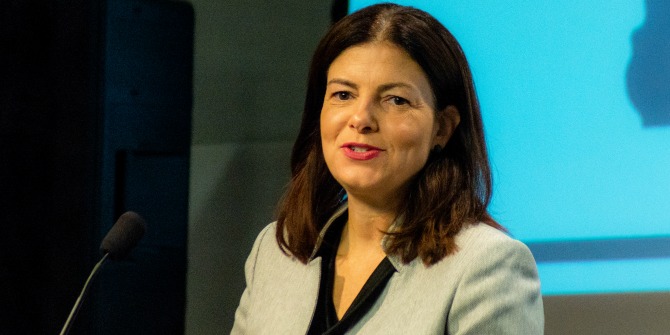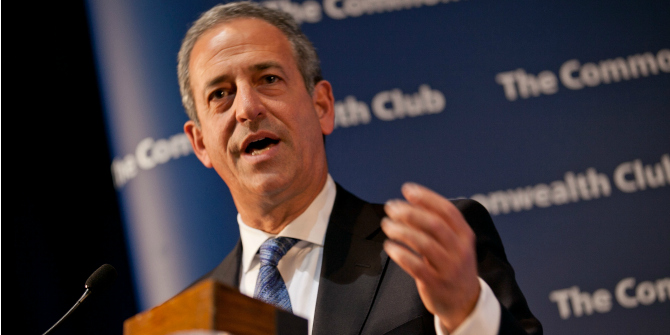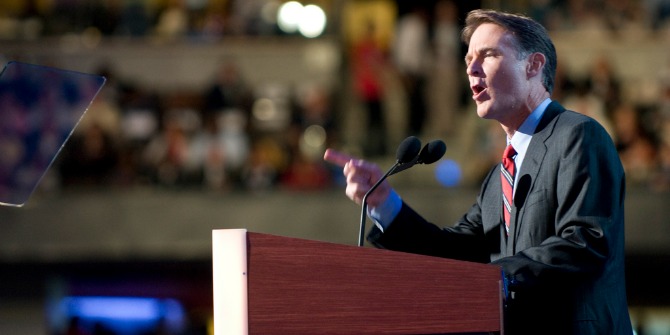 In contrast to the polarized and polarizing presidential campaigns, both candidates in the New Hampshire Senate race have run centrist campaigns aimed at courting the state’s independent voters. As part of our series covering key Senate races in the 2016 election, Dean Spiliotes writes that the incumbent Republican Senator, Kelly Ayotte, is attempting to distance her campaign from Donald Trump’s, while her challenger, Democratic Governor Maggie Hassan, has been criticized for her own uneven support for Hillary Clinton.
In contrast to the polarized and polarizing presidential campaigns, both candidates in the New Hampshire Senate race have run centrist campaigns aimed at courting the state’s independent voters. As part of our series covering key Senate races in the 2016 election, Dean Spiliotes writes that the incumbent Republican Senator, Kelly Ayotte, is attempting to distance her campaign from Donald Trump’s, while her challenger, Democratic Governor Maggie Hassan, has been criticized for her own uneven support for Hillary Clinton.
“Caught between a rock and a hard place,” is a phrase frequently used these days to describe where you might find United States Senator Kelly Ayotte of New Hampshire, as the Republican lawmaker runs for reelection this November. On one side, Senator Ayotte is contending with a controversial Republican presidential nominee in Donald Trump; in response to relentless media prodding, she has repeatedly said that she will support, but not endorse, the GOP standard-bearer. On the other side Ayotte is feeling pressure from New Hampshire conservatives who believe that she has strayed repeatedly from core party principles on a variety of legislative issues before the US Senate, such as immigration and climate change. As a result, at least one conservative has launched an independent bid and will be on the ballot with Ayotte and Hassan, in a race where small margins could have a big impact on the outcome.
For Maggie Hassan, the current two-term Democratic governor of New Hampshire, her bid to unseat Senator Ayotte, while continuing to serve as governor, has raised its own set of political challenges. While Hassan has been a strong supporter of Democratic presidential nominee Hillary Clinton, she has at times struggled to clearly articulate that support, most famously in a viral CNN interview, in which Hassan repeatedly failed to vouch for Clinton’s honesty as a politician. Hassan has also been hit hard by opponents for her response to the opioid crisis ravaging New Hampshire like much of the country, and for deficiencies in the state’s mental health system.
Their respective challenges notwithstanding, both politicians have remained popular in New Hampshire. Ayotte and Hassan have enjoyed favorability ratings in the high 40s and low 50s over the past few years, and most polling has the race in a dead heat. Given that Donald Trump has consistently trailed Hillary Clinton in New Hampshire by as much as nine points in recent months the closeness of the US Senate race is no small victory for Ayotte. It suggests that she is having some success in decoupling her reelection bid from the polarizing national political brawl at the top of the ticket. It remains to be seen whether Ayotte’s recent debate comments affirming Trump as a role model for children, and her subsequent retraction, will fundamentally alter this dynamic in the race.
Ayotte’s best hope for victory in November is that Republican voters who are disenchanted with their unpopular presidential nominee will view her race as a fundamentally different sort of choice than the one for president. While the Hassan campaign is more closely aligned with Clinton’s far-reaching state organization, Governor Hassan must also contend with an unpopular presidential nominee, particularly as she searches for support from New Hampshire’s independent or “undeclared” voters. This block of voters represents a greater source of electoral support for candidates in New Hampshire than either of the two major parties.

Given the desire of both Ayotte and Hassan to court independent voters by pushing back against opposition attempts to tie them to their unpopular presidential nominees, what has emerged in New Hampshire during this general election is a fairly traditional centrist campaign, in which both Ayotte and Hassan are downplaying party labels and focusing on appeals to bipartisanship and their ability to deliver for New Hampshire citizens, irrespective of the visceral partisan politics at play on the national scene. In a year when so much of politics is dominated by the presidential race, both Ayotte and Hassan have strived to keep the political tumult at arm’s length by presenting themselves as a different kind of politician, pragmatic and problem-solving for New Hampshire, while not unexpectedly attempting to tar their opponent with the taint of national party ideological extremism.
All else being equal, Governor Hassan has some built-in advantages in this election cycle. While New Hampshire is often referred to as a “swing” or “purple” state due to frequent party changes, especially in the first congressional district where two current and former incumbents are facing each other for the fourth time, the state has had only one Republican governor in the past twenty years, and a Republican presidential candidate has not won the state since 2000, when George W. Bush narrowly defeated Al Gore in race complicated by Ralph Nader’s presence on the ballot. Democrats have experienced comfortable margins in New Hampshire in recent presidential years, in stark contrast to their weaker showings during the midterms. Maggie Hassan is no doubt hoping that the trend will continue this time, as well.
Ayotte likely understands the very different electoral context from the one that she faced in 2010, the apex of the Tea Party Rebellion, when she first ran in the GOP primary against Ovide Lamontagne, a popular conservative who pulled her to the right on a variety of policy issues in a very tight race. Ayotte went on to easily defeat her Democratic opponent in the general election. This time around, Ayotte is talking about how bipartisan problem-solving is “in her DNA,” highlighting legislative partnerships with several Democratic senators, and citing former, and traditionally more moderate, New Hampshire Senators Judd Gregg and Warren Rudman as big influences.
Hassan has also attempted to reposition herself as a pragmatic politician willing to separate from Clinton and the Obama Administration. She was the only Democratic governor in the country to call for a temporary halt to the intake of Syrian refugees on security grounds, and she has repeatedly opposed President Obama’s desire to close the military prison at Guantanamo Bay.
All of this positioning by Ayotte and Hassan is taking place within the context of what will likely be the most expensive race for statewide office in New Hampshire history. With total spending already surpassing $50 million, including significant financial stakes by a variety of outside groups, some suggest that we are experiencing what will be the state’s first $100 million contest, when all is said and done. All that remains to be seen is which incumbent statewide officeholder will emerge as our next US Senator in a race that feels like New Hampshire, but looks like a race with far-reaching national implications.
Featured image: Senator Kelly Ayotte, Credit: Marc Nozell Flickr (CC-BY-2.0)
Please read our comments policy before commenting.
Note: This article gives the views of the author, and not the position of USAPP – American Politics and Policy, nor of the London School of Economics.
Shortened URL for this post: http://bit.ly/2djt411
_______________________________
 Dean Spiliotes – Southern New Hampshire University
Dean Spiliotes – Southern New Hampshire University
Dean Spiliotes is a veteran political scientist and political analyst with broad expertise in presidential politics and policy, campaigns and elections – especially New Hampshire politics and its presidential primary. His extensive knowledge and experience brought him to Southern New Hampshire University, where he is Civic Scholar in the School of Arts and Sciences. He is the author of the book, Vicious Cycle: Presidential Decision Making in the American Political Economy.






